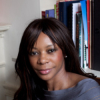Dambisa Moyo

Dambisa Moyo
Dambisa Moyo2 February 1969) is a Zambian-born international economist and author who analyzes the macroeconomy and global affairs. With post-graduate degrees in business, public administration, and economics from American University, Harvard, and Oxford, Moyo currently serves on the boards of Barclays Bank, the financial services group, SABMiller, the global brewer, and Barrick Gold, the global miner. She worked for two years at the World Bank and eight years at Goldman Sachs before becoming an author and international public speaker. She...
NationalityZambian
ProfessionEconomist
Date of Birth2 February 1969
CountryZambia
There's not a single country that actually approaches economics in a pure, free market, capitalist way. I like the free market - but it very much exists only in textbooks. If I had a choice, and we could live in a very pure world, I would be a supporter of the free markets.
I'm not a politician - it's not my cup of tea.
A constant stream of 'free' money is a perfect way to keep an inefficient or simply bad government in power. As aid flows in, there is nothing more for the government to do - it doesn't need to raise taxes, and as long as it pays the army, it doesn't have to take account of its disgruntled citizens.
I had the good fortune to spend hours with my parents around the dinner table having debates on politics and economics.
The insidious aid culture has left African countries more debt-laden, more inflation-prone, more vulnerable to the vagaries of the currency markets and more unattractive to higher-quality investment.
We've reached a very low-level equilibrium where it's not clear whose interest it is in to develop Africa... It's not in the interest of those in the aid industry to develop Africa because then there'd be no more industry and 500,000 people would lose their jobs. The only people whose interest it is in is Africans, but they have no voice.
Too many African countries have already hit rock-bottom - ungoverned, poverty-stricken, and lagging further and further behind the rest of the world each day; there is nowhere further to go down.
The World Bank can only survive if it's spending money.
The western mindset erroneously equates a political system of multi-party democracy with high-quality institutions... the two are not synonymous.
The most obvious criticism of aid is its links to rampant corruption. Aid flows destined to help the average African end up supporting bloated bureaucracies in the form of the poor-country governments and donor-funded non-governmental organizations.
'Dead Aid' is about the inefficacy and the limitations of large-scale aid programs in creating economic growth and reducing poverty in Africa.
Thanks to aid, a distressing number of African leaders care little about what their citizens want or need - after all it's the reverse of the Boston tea-party - no representation without taxation.
I have dedicated many years to economic study, up to the Ph.D. level, to analyze and understand the inherent weaknesses of aid and why aid policies have consistently failed to deliver on economic growth and poverty alleviation.
I am fortunate: my parents told me the world was my oyster, when they could have said I wouldn't make it for a lot of reasons - rural, girl, small African country. So, no regrets.